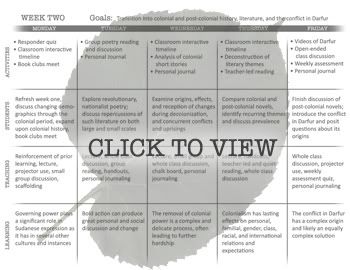
Please click the above image to view or download the instructional
planning matrix for Week Two. Or click here for all five matrices.
MONDAY
Refresh prior knowledgeContinue explanation of colonial history
- Using electronic responders, students will answer several multiple-choice and oral-answer questions in order to prepare for this week's lesson and connect it meaningfully with that information covered in the week prior
Book clubs meet
- Special attention will be paid to changing demographics of colonized Sudan
- The classroom timeline will be updated accordingly by student volunteers to visually represent these changes
Resources Needed:
- Gather students into book club groups for the first time
- Groups will discuss first impressions of the book, compare notes, with scaffolding and discussion mediation when necessary
- Assign responsibilities to each member of the group and discuss the schedule for the end-of-unit presentations to ensure groups are aware of time constraints
• Promethean Responders
• Powerpoint presentation
• Timeline
TUESDAY
Begin colonial poetryAddress connections to historical perspective
- Read and discuss Abdul Raheem Glailati’s revolutionary, nationalist poetry Masamat al-rabi (Spring Breezes)
- Identify historical and social elements in this work
Current events presentation introduction and sign-up
- Introduce effects of Glailati’s work in both the Sudanese and British spheres and address the personal story of Glailati’s life as it relates to this history
Resources Needed:
- Students will sign up for a day on which to present a news article dealing with current events in Sudan and Darfur and be given a list of possible resources with which to find their article (resources and example article are provided in the sidebar to the right)
- Groups (of one to three students) will meet briefly and begin looking for an article with any time remaining in class
• Copies of Glailati's Masamat al-rabi (Spring Breezes)
• Powerpoint presentation
• Current events sign-up sheet
• Internet access
WEDNESDAY
Introduce colonial short storiesBegin a discussion of decolonization and Sudanese civil war
- Discuss excerpts from Haradat al-Sudan (Sudanese Culture), a weekly newspaper that provided a platform for many budding writers and identify common themes
- Address short works by Hamza al-Malik Tambal and Arafat Mohammad Abdulla and discuss whether their efforts to establish a Sudanese national literature independent from that of Britain or Egypt were successful
- Draw particular emphasis between pre- and post-1924 uprising literature
Personal journal assignment
- Touch on the 1919 Egyptian uprising and Sudan’s resulting resentment that Egypt didn't vie for their independence as well, despite their alliance
- Illustrate connections between the end of World War II, the Yalta Conference, and colonial independence
- Discuss the effects of independence in Sudan, including the growth of conflict and economic strife
Resources Needed:
- In small groups, students will respond to one of the short stories read in any way they feel appropriate
• Excerpts from Haradat al-Sudan (Sudanese Culture)
• Works from Tambal and Abdulla
• Powerpoint presentation
THURSDAY
Continue discussion of post-colonial historyDraw connections to post-colonial literature with an emphasis on the novel
- Continuing with the media-rich PowerPoint, discussing the effects of decolonization and the resulting structural, economic, and cultural problems and conflicts
- Address the growth and culmination of the Sudanese civil war and its direct connections to contemporary events
- Add key events to the classroom timeline
Introduce novel by Tayeb Salih
- Discuss pre- and post-1964 revolution excerpts and discuss the reflections we can identify in Sudanese history
- Read excerpts from Osman Mohammad Hashim's tragic love story Tajuj and other novels should time permit
- Students will pick out dominant themes (such as romanticized landscape and character) and discuss why these themes may be prevalent in light of historical elements
Personal journal assignment
- Begin reading Salih's Mawsim al-hijra ila al-Shamal (Season of Migration to the North) aloud to the class; invite them to continue reading quietly at their desks
- Identify a few points that students should pay particular attention to or with which they may need help
- Students will finish novel at home
Resources Needed:
- In writing, students will briefly predict how these historical elements combined to create the post-colonial literary climate
• Powerpoint presentation
• Timeline
• Pre- and post-1964 revolution excerpts
• Selections from Hashim's Tajuj
• Copies of Salih's Mawsim al-hijra ila al-Shamal (Season of Migration to the North)
FRIDAY
Finish discussion of Salih's novelBegin brief overview of the conflict in Darfur
- Allow students to lead the discussion, but mediate when necessary
- Ensure the class touches on what his book indicates about the post-colonial environment
Personal journal assignment
- Hold a brief lecture giving only the briefest of details
- Screen a few video clips about the crisis in Darfur to illustrate the gravity and impress the reality of the situation upon the class
Weekly assessment
- Students will speculate upon what events may have led to such a conflict or how the tumultuous state of post-colonial Sudan may have contributed to the situation
Resources Needed:
- Hold a brief, open note history quiz to gauge comprehension, areas of difficulty, and inform next week's lessons
• Copies of Salih's Mawsim al-hijra ila al-Shamal (Season of Migration to the North)
• Powerpoint presentation
• Clips from relevant documentaries
• Quiz





No comments:
Post a Comment